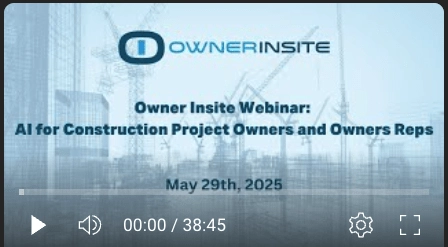Tackling Construction Costs
Managing construction costs has never been more challenging, with fluctuating material prices creating uncertainty for project owners and contractors. A material escalation clause safeguards against unpredictable cost increases, ensuring financial stability and project continuity. Properly implemented, these clauses help mitigate risks and provide a clear framework for cost adjustments after contract signing.
What Is Cost Escalation in Construction?
A material escalation clause is a contractual provision that allows for price adjustments when the cost of specific materials rises beyond a predetermined threshold. It protects contractors from unexpected cost spikes and helps project owners anticipate budget changes, promoting fairness and transparency throughout the project lifecycle.
Key benefits include:



Protecting stakeholders from market volatility
Enabling better financial planning and cost control.
Reducing the potential for disputes related to rising costs.
Defining Cost Escalation
Cost escalation is the inevitable rise in project costs over time due to market fluctuations and unforeseen conditions. Whether it’s labor shortages or supply chain disruptions, these challenges impact construction projects, affecting contract prices and overall profitability.
Key Drivers of Cost Escalation in Construction
Labor Costs and Shortages
Labor shortages drive labor costs upward, creating financial risk for project owners and contractors. Skilled workers demand higher wages, which escalates contract prices based on market demand.

Fluctuating Material Prices
Building materials such as asphalt, steel, and concrete experience price escalation due to changing market conditions. Raw materials availability, demand fluctuations, and global supply chain disruptions contribute to these increases.

Fuel Costs
Fuel costs directly impact transportation and equipment operations, increasing the total project cost. As fuel prices fluctuate, construction contracts often require price escalation clauses to adjust for these variations.

Understanding Escalation Clauses
Escalation clauses are vital provisions in construction contracts. They offer protection against cost fluctuations and financial risk and ensure fair adjustments to the contract price based on material escalation and other market-driven factors.
What Is an Escalation Clause?
An escalation clause is a contract provision that allows adjustments in pricing when defined factors, such as labor costs or raw materials, experience significant cost increases beyond agreed-upon thresholds.
Key Elements of an Escalation Clause
- Trigger Conditions: Clearly defined thresholds that activate the clause, such as labor shortages or fuel cost spikes.
- Adjustment Formula: The method used to calculate cost fluctuations and apply adjustments.
Notification Requirements: The process through which contractors must submit documented requests for adjustments.
Common Applications in Contracts
Escalation clauses are commonly found in:
- Fixed-price construction contracts where market volatility poses a significant risk.
- Cost-plus contracts to ensure project owners cover price fluctuations fairly.
- Subcontracts with suppliers to address price escalation of key building materials.
Types of Escalation Clauses
Material-Specific Clauses
These clauses, which focus on price fluctuations for essential materials such as steel, petroleum, and lumber, allow cost adjustments based on significant market changes. They are particularly beneficial for long-term projects where price volatility is expected.

Labor Rate Clauses
These clauses, designed to protect contractors from changes in labor costs, are especially relevant in public works projects with mandated wage increases. They ensure contractors are not disadvantaged by rising wages, keeping projects on track financially.

Fuel and Energy Clauses
Fuel and energy costs can significantly impact project budgets, particularly for transportation-heavy operations or those relying on heavy machinery. These clauses provide a mechanism to adjust for rising energy expenses, ensuring financial stability despite market fluctuations.

The Impact of Cost Escalation on Construction Projects
Project costs rising due to significant increases can severely impact timelines and financial outcomes. Without proper planning, construction projects can face budget overruns and contract disputes.
An Unavoidable Issue
Effects on Project Budgets
- Unplanned Cost Overruns: Rising material costs can derail budgets without a price escalation clause.
- Project Delays: Increased costs may lead to procurement issues and workflow disruptions.
Contract Disputes: Project owners and general contractors may face legal challenges due to contract price adjustments.
Benefits of Including Escalation Clauses in Contracts
Incorporating escalation clauses in construction contracts provides stability, ensuring financial security for contractors and project owners.
Why Escalation Clauses Are Essential
- Minimize financial risk and protect contractors from unexpected price surges.
- Provide transparency in contract price adjustments based on market trends.
How They Benefit Contractors and Owners
- Contractors: Maintain profitability despite rising costs.
- Project Owners: Gain predictability and improved cost control measures.
Best Practices for Drafting and Using Escalation Clauses
Escalation clauses should be carefully written and clearly defined within contracts to maximize protection and effectiveness.
Using Industry Indices for Accurate Calculations
Leverage construction cost indices to define percentage-based escalation provisions and ensure accurate pricing adjustments.
Incorporating Force Majeure Clauses
By including force majeure clauses, you can address unforeseen events such as economic downturns, fuel shortages, or supply chain disruptions.
Avoiding Common Drafting Pitfalls
- Clearly define escalation factors.
- Ensure written documentation of adjustments and requests.
- Establish notification timelines for contract compliance.
Tools and Strategies for Managing Cost Escalation
Successful construction projects utilize software solutions and strategic planning to handle cost increases effectively.
Key Tools and Strategies
- Owner Insite Software: Enables project owners to track contract price changes, submit adjustment requests, and monitor real-time cost fluctuations.
- Market Trend Analysis: Stay updated on building materials prices and labor costs to anticipate future changes.
Collaborative Communication: Engage contractors, suppliers, and stakeholders to address potential pitfalls before they escalate.
Protect Your Projects from Cost Escalation
Don’t let unexpected cost increases eat into your profits. Take proactive steps with Owner Insite’s cost management solutions.
Implementing Escalation Clauses Effectively
Proper implementation of escalation clauses is crucial for maximizing their effectiveness and avoiding misunderstandings. To ensure seamless integration, consider the following key factors:
Clear Definition
Define the specific conditions triggering the clause, including thresholds for price changes, adjustment calculations, and notification requirements. A well-defined clause minimizes ambiguity and potential disputes.
Documentation
Accurate records must be maintained to support claims under a material escalation clause. Detailed documentation of supplier invoices, market reports, and cost trends helps validate price adjustments and ensures compliance with contract terms.
Communication
Proactive communication between contractors and project owners is critical. Clearly outlining the impact of cost changes and keeping all stakeholders informed helps maintain trust and project momentum.
Legal Considerations
A poorly drafted escalation clause can lead to legal disputes and financial complications. Ensuring legal clarity and fairness is key to successful contract execution.
Best practices include:
- Drafting clauses that balance the interests of both parties to avoid conflicts.
- Ensuring compliance with local regulations and industry standards.
- Establishing precise dispute resolution mechanisms in case of disagreements over cost adjustments.
Failure to adequately implement an escalation clause can result in financial strain, project delays, or legal action. Consulting with legal professionals can help safeguard project interests when drafting or reviewing these clauses.
A well-structured material escalation clause is an essential tool for navigating the complexities of construction costs. Project owners and contractors can protect their financial interests and ensure successful project delivery by implementing the right escalation strategy and maintaining open communication.




